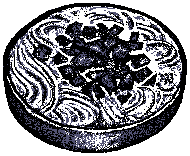|
|
|
Rice
of course is the staple food of Japan, but the second most popular
food would have to be menrui (noodles). Noodles
are eaten the day round in Japan and are served in many different
ways, both hot and cold. There are all kinds of noodles, but the
two most popular are soba (buckwheat) and udon
(white flour).
|
 |
| Soba
noodles are thin, flavorful, and generally light brown in color.
They come in various sizes and colors, there's even a type made
with powdered green tea called cha-soba. During the
summer months soba is served cold in shallow bamboo baskets, and
the noodles are dipped into a cold dipping sauce. In winter the
noodles make their appearance in hot dashi, and are accompanied
by ingredients like fried tofu, vegetables and meats. Udon
is a very thick and pasty wheat noodle that is served in hot dashi
and topped with the same condiments as the soba noodles. Here are
two of my favorite noodle dishes... the first is meant for the winter
months, the second for summer. |

|
Kitsune
means "fox" and this dish is named for the light brown color of
the abura-age (deep fried tofu). Kitsune udon consists
of noodles served in hot shoyu flavored dashi. You can buy abura-age
at an Asian food market, otherwise you can learn how to cook it
here.
There
are many variants to this recipe, instead of the deep fried tofu
try placing a piece of shrimp tenpura on top, or try topping with
a raw egg... called tsukimi or "moon viewing" noodles
since the raw egg looks like the moon).
|
INGREDIENTS
4 pieces of abura-age (deep fried tofu),
cut into large triangles
1 package of dried udon or soba noodles
(about 3/4 lb.)
4 green onions (finely slivered)
BROTH
6
1/2 cups of dashi (see
basics
for
preparation method)
3 tablespoons of shoyu
1 tablespoon of sugar
1 tablespoon of sake
Heat
the broth ingredients in a small pot, and in a separate sauce
pan simmer the tofu in a cup of hot dashi. Meanwhile cook the
dried noodles (see the basics
section
on cooking noodles), then rinse them in a colander using hot water,
drain, and then transfer to serving bowls. Place the tofu on top,
pour the hot broth over the noodles and garnish with the green
onions.
|
|
This
version of soba noodles is as simple as it gets. Served at room
temperature or chilled, this is the perfect meal for a hot summer.
The noodles are topped with crumbled nori, cubed tofu, green onions,
and wasabi.
1
ten once package of dried soba noodles
DIPPING
SAUCE
1
1/4 cups of dashi (see
basics
for preparation method)
1/2 cup of shoyu
1/4 cup mirin
1 teaspoon sugar
CONDIMENTS
1
sheet nori seaweed (lightly toasted over the stove top flame
and then crumbled)
1/2 block of chilled tofu cut into small one inch cubes
4 tablespoons of finely diced green onions
1 tablespoon of wasabi paste
Ahead
of time, mix and heat the dipping sauce ingredients in a small saucepan,
remove and let cool (you can chill this if you like). Cook the dried
soba noodles (see the basics
section
on cooking noodles), then rinse them well in a colander using cold
water, drain, then place in ice water, drain again. Serve the soba
on a woven bamboo tray (zaru) meant for noodles or in small lacquer
bowls. Place the cubed tofu on top, and garnish with the green onions,
crumbled nori, and wasabi. Using hashi (chopsticks), dip the noodles
into the cold dipping sauce. |

|
|